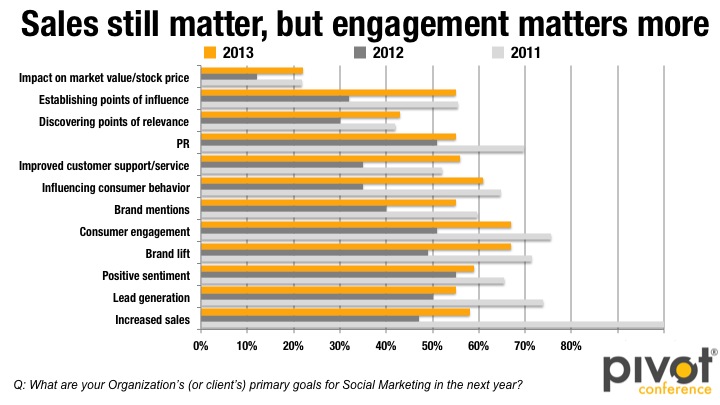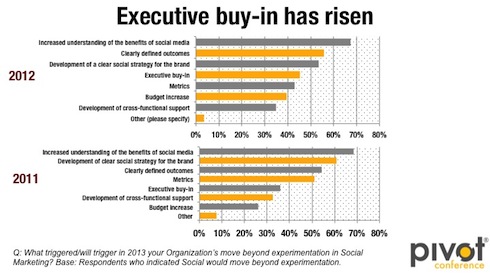By adaptive - November 20th, 2013
It’s important to have a social media presence, but is it meeting your business goals? Here’s how to make sure it does.
Having a social media presence is now an essential for any corporate looking to make their brand stand out from the crowd and engage with customers. The problem really lies in how to measure the value of a social media investment and how to link it to the bottom line. The first step is to outline your business objectives and then ensure that they are effectively met when developing your social media strategy.
A report recently produced by the Managing Partners’ Forum (MPF) and Elephant Creative entitled ‘Exploring management attitudes towards digital and social technologies’, outlined some of the primary considerations that any business needs to examine when planning their social media objectives and highlighted the value of clarifying purpose before investment.
“Firms must determine the purpose and set criteria for investing time and financial resources into digital and social tools, based on the true cost of each tool when evaluated against alternatives,” says Richard Chaplin, Founder and CEO of the Managing Partners’ Forum, “Many firms do not properly factor in the hours spent on using these tools across the business when costing their strategies.”
Social media’s role is, among other things, to build brand identity and awareness of products and services. Unfortunately a common mistake is to measure that role against the number of sales generated. If this is the only measure used this can lead to skewed results.
“To see the primary measurable outcome as the number of new instructions is a dangerous mismatch, as it is likely to result in unreasonable expectations and an inaccurate picture of achievements and shortcomings,” says Chaplin.
However much the business needs social media to grip the hands of the consumers, it still has to justify the investment, regardless how large or small. Fortunately, as social media evolves, so has executive buy in. More of those in management are aware of the different tools needed to evaluate social impact and ROI.
Performance anxiety
“Performance should be measured on aspects such as engagement and personality as well as direct sales activity,” says Gavin Cockerill, Managing Director of Flyerzone, “It is not easy to work out ROI from social media, but it isn’t impossible and there are data-centric KPIs that help. You need to think about what’s important to your business.”
Cockerill suggests the following steps towards assessing the value of social media against your business objectives:
-
Analyse website traffic. Examine the cost of PPC campaigns as a per person average and then measure that against visitors from free social media activity.
- Define your social reach and establish how this is measured and then compare these to analysis with your PPC. As you see spikes in social reach note how it affects your traffic, conversions and revenue
Measuring social media is not impossible, but it isn’t easy. This is a rapidly growing discipline that has yet to deliver definitive solutions to determining the ultimate value of social media interaction, but it can work well within the boundaries of your business goals. Having a prescribed set of competencies means that you can measure the value of each objective within your own framework and determine their success or failure.
In a case study provided by Silverpop, T.M. Lewin, a large clothing retailer with over 100 stores in the UK, the brand needed to grow its social media presence at the same time as increasing its ROI. The solution was to use the Silverpop Engage solution to centralise customer and contact data and enable the marketing teams to segment the data for its needs using the data query functionality built in.
The result was an increase in revenue directly attributable to the email campaigns. More than 4,500 social shares with customers acting as brand ambassadors for the company and a 45% increase in Facebook likes, which resulted in more than 1000% increase in Facebook engagement.
The success of the campaign was attributed to targeted communications that complemented T.M. Lewin’s efforts to unify social media and email efforts to drive engagement and increase database size. It was a case of taking a specific business objective and creating a social media solution that directly tied to it.
Meeting goals
According to Professor Steven Van Belleghem, companies often confuse the two types of ROI and suggest a number of starting points for the organisation:
- Increase sales leads
- Reputation building
- Increase the emotional bond with the customer
“You have the ROI of a specific campaign, which is a short term measurement, but you also have the ROI of your total digital business plan. The latter is the most important and the first step for any business is to agree on the objectives,” says Bellegham.
The MPF report concurs, indicating that for the firms, surveyed the main purposes of social media marketing: “Building and maintaining brand image positioning (95%), attracting new clients through increased awareness (85%), retaining existing clients (65%) and SEO (61%). Only 21% used it as a client care tool.” A glimpse at a recent Pivot report confirms that while sales still matter to the organisation in terms of social value, engagement now matters more."
Lynsey Sweales, Social Media and Online Marketing expert at SocialB, wraps it up nicely saying, “Keep it simple and measure the key areas that can help achieve success. The easiest way to do this is to look at your overall business objectives as a starting point and keep note of your key measurements. When it comes to social media measuring is no different, just ensure that you measure the areas that are useful to your business.”
In part two of this series we will be examining how engagement is of importance to brand reputation and how to gauge the success of these relationships.
Next Reads
June 2014, New York
Become a social business: For superior marketing response, sharper corporate decision-making, enhanced innovation and a happier, more loyal customer
Brochure Programme

